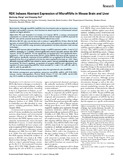RDX Induces Aberrant Expression of MicroRNAs in Mouse Brain and Liver
Author
Zhang, Baohong; Pan, Xiaoping
Abstract
Background: Although microRNAs (miRNAs) have been found to play an important role in many biological and metabolic processes, their functions in animal response to environmental toxicant exposure are largely unknown.
Objectives: We used hexahydro-1,3,5-trinitro-1,3,5-triazine (RDX), a common environmental contaminant, as a toxicant stressor to investigate toxicant-induced changes in miRNA expression in B6C3F1 mice and the potential mechanism of RDX-induced toxic action.
Methods: B6C3F1 mice were fed diets with or without 5 mg/kg RDX for 28 days. After the feeding trials, we isolated RNAs from both brain and liver tissues and analyzed the expression profiles of 567 known mouse miRNAs using microarray and quantitative real-time polymerase chain reaction technologies.
Results: RDX exposure induced significant changes in miRNA expression profiles. A total of 113 miRNAs, belonging to 75 families, showed significantly altered expression patterns after RDX exposure. Of the 113 miRNAs, 10 were significantly up-regulated and 3 were significantly down-regulated (p <Â 0.01) in both mouse brain and liver. Many miRNAs had tissue-specific responses to RDX exposure. Specifically, expression of seven miRNAs was up-regulated in the brain but down-regulated in the liver or up-regulated in the liver but down-regulated in the brain (p <Â 0.01). Many aberrantly expressed miRNAs were related to various cancers, toxicant-metabolizing enzymes, and neurotoxicity. We found a significant up-regulation of oncogenic miRNAs and a significant down-regulation of tumor-suppressing miRNAs, which included let-7, miR-17-92, miR-10b, miR-15, miR-16, miR-26, and miR-181.
Conclusions: Environmental toxicant exposure alters the expression of a suite of miRNAs. Originally published Environmental Health Perspectives, Vol. 117, No. 2, Feb 2009
Subject
Date
2009-02
Citation:
APA:
Zhang, Baohong, & Pan, Xiaoping. (February 2009).
RDX Induces Aberrant Expression of MicroRNAs in Mouse Brain and Liver.
Environmental Health Perspectives,
117(2),
231-
240. Retrieved from
http://hdl.handle.net/10342/3104
MLA:
Zhang, Baohong, and Pan, Xiaoping.
"RDX Induces Aberrant Expression of MicroRNAs in Mouse Brain and Liver". Environmental Health Perspectives.
117:2. (231-240),
February 2009.
June 29, 2024.
http://hdl.handle.net/10342/3104.
Chicago:
Zhang, Baohong and Pan, Xiaoping,
"RDX Induces Aberrant Expression of MicroRNAs in Mouse Brain and Liver," Environmental Health Perspectives 117, no.
2 (February 2009),
http://hdl.handle.net/10342/3104 (accessed
June 29, 2024).
AMA:
Zhang, Baohong, Pan, Xiaoping.
RDX Induces Aberrant Expression of MicroRNAs in Mouse Brain and Liver. Environmental Health Perspectives.
February 2009;
117(2):
231-240.
http://hdl.handle.net/10342/3104. Accessed
June 29, 2024.
Collections
Publisher
East Carolina University

